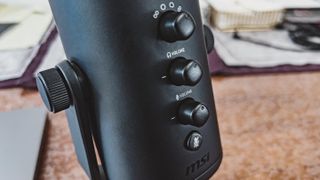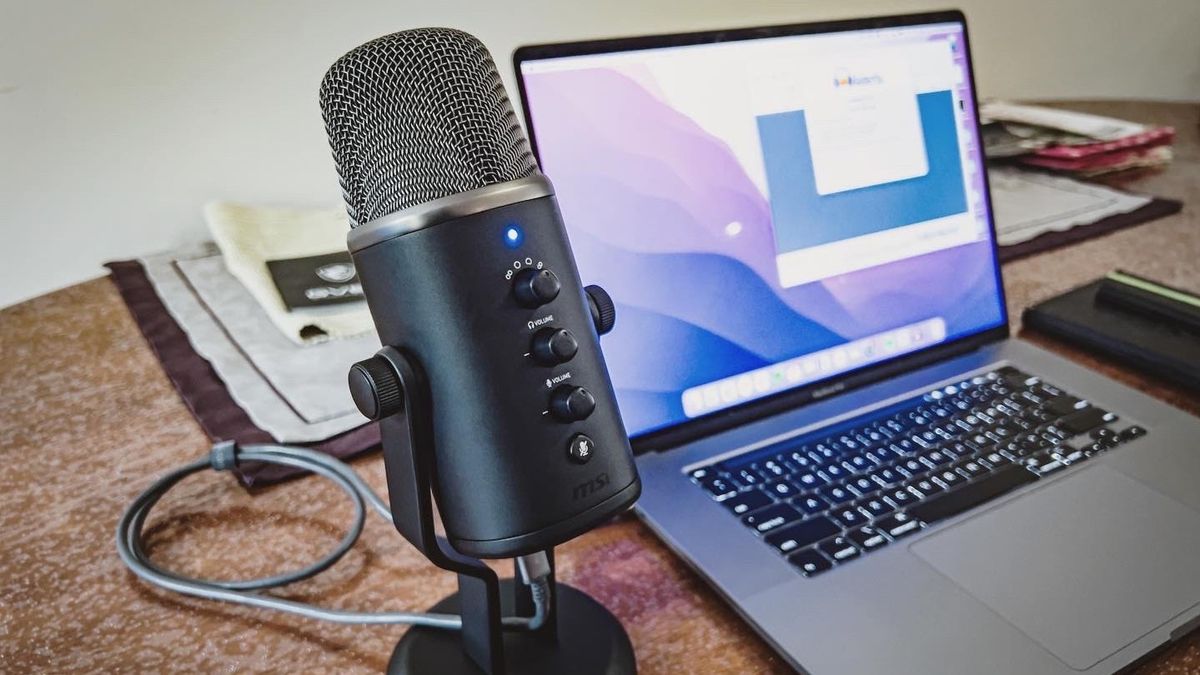12DOVE Verdict
To nobody’s surprise, an audio giant with decades of seminal hardware to its name does not slip up anywhere in delivering a new streamer mic.
Pros
- +
Excellent audio quality
- +
Handsome design and sturdy build
- +
Four polar patterns
- +
No software needed
- +
Mic monitoring
Cons
- -
No software for finer controls
- -
Stiff competition at the price
Why you can trust 12DOVE
MSI is renowned for its plethora of PC components and accessories and with its first-ever microphone, the Immerse GV60 Streaming Microphone, the company is looking to continue its domination and move into the best microphones for streaming space. The GV60 is a USB condenser microphone aimed squarely at streamers and content creators who want a high quality, no fuss, plug-and-play experience.
Retailing at the $130/£100 mark, the GV60 competes directly with some of the best streaming microphones like the Blue Yeti X and Razer Seiren V2 Pro. Now those are big acts to follow. But with multiple condensers, 24bit/96kHz lossless audio, and no need for any special software, the MSI offering can certainly hold its own.
After two weeks of using the GV60 as my primary microphone for all my work Zoom calls and other voice work, I'm extremely pleased with it and I'm here to tell you all about it.
Design & features

The Immerse GV60 Streaming Mic reminds me a lot of the Blue Yeti X microphone in terms of design. This is an elegant, sturdy microphone that feels as much as soon as you take it out of the box - in no small part due to its hefty 1.1kg weight. You’ll need to keep that in mind if you plan to mount it on a boom arm - though this is easy thanks to the 5/8” threading in the base. That’s also where you’ll find the USB Type-C port for connecting the mic and a 3.5mm headphone jack for real-time monitoring.
The microphone itself is rather typical in appearance: a thick, black, metallic cylinder with a mesh top. The mesh hides multiple condensers that allow for four different pickup patterns. For those prone to splattering their mics, MSI includes a removable pop filter to help reduce plosives but in my experience, it wasn’t necessary. The mic captures audio up to 24bit/96kHz sample rate which makes for very rich, crisp audio.
One of the best things about the GV60 is that it doesn't need any drivers or fancy software. All the controls live on the mic itself with solid dials and a chunky mic mute button. An LED status light indicates whether the mic is active or muted. The dials switch pickup patterns and adjust headphone volume and microphone gain. The dials are fairly stiff to turn and lack grip due to their smooth finish; a textured finish would have served them much better.

The microphone is held up by a sturdy desk stand which can tilt it back or forward 90 degrees with knobs to secure the microphone in the desired position. The stand has a rubber base that prevents it from sliding about and reduces feedback from desk noise like typing or mouse movements. Overall, a handsome but not distracting design that I am happy with.
Performance
The first day I used the GV60 on a team Zoom call, everyone immediately noted the difference and asked if I was using a new microphone. I sounded so much clearer and richer to them than ever before. In jest, I moved the microphone closer to my mouth to show off my bassy voice to which they exploded in laughter.
The GV60 sounds fantastic, beating my Razer Seiren V2 Pro and Thronmax MDrill One. Voice pickup and tonality are excellent and true to life with a warmth that makes you sound much more professional. I didn't even have to fiddle with the mic gain which is a first. Unlike those, I did not experience any background noise or distortion.
I especially love that I didn’t need to fiddle with some complex software like the Seiren V2 Pro that I also have. It's as simple as just plugging in the GV60 and then you can start making quality content. Some people might prefer finer control but I appreciate the simplicity of what's on offer here.
For most things, you'll be using the cardioid pattern but you can switch to Stereo, Omnidirectional, and Bidirectional on the fly. Podcasters will enjoy the stereo or bidirectional pattern when hosting multiple guests at a time. And YouTubers will love the quality of voiceovers this microphone produces. Check out the sample below and judge for yourself. No matter what kind of content you are creating, the GV60 captures it beautifully.
Should you buy the MSI Immerse GV60?

The MSI Immerse GV60 Streaming mic is a fantastic first try from the company and a worthy addition to our top picks for streaming microphones. At $130/£100, it's slightly cheaper than its main rivals but matches them in performance.
If you're a budding or professional streamer or content creator or maybe just a gamer who wants a high-quality microphone for work and play, then this should be high on your list of targets.
How we tested the MSI Immerse GV60
Since I work fully remote from home, I put the GV60 to good use for my numerous daily Zoom calls on my MacBook as well as some private video voiceovers on my Windows PC. While I don’t stream, I’ve certainly spent on average 3 hours daily for the last two weeks streaming myself to my work colleagues over Zoom, Google Meet both in-app and web browser. The microphone was used in its desk stand to test its stability and durability.
Research how to create a full streaming for gamers setup with our guide, and also don't forget about one of the best webcams and best capture cards too.
Kizzy is the consummate geek, with black turtleneck design sensibilities, and is always on the hunt for the latest, greatest, and sexiest tech. He's written reviews for PCGamer, Digital Trends, TechRadar, and PowerUp Gaming Australia. He's played Doom on the OG Pentium 1 and still remembers life before Google. After three decades of being crazy about tech, he's literally just getting started. It's the age of the geek, baby!

Despite Zelda: Majora's Mask basically being a horror game, one of its key devs didn't think its creepiest features were scary at all: "People on the team were like 'whoa!'"

Corsair exec says GTA 6 is coming to PC in early 2026 and then quickly un-says that

This puzzle game has done the impossible: waiting around for something to happen has never, ever been this fun
Most Popular






